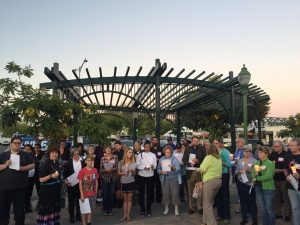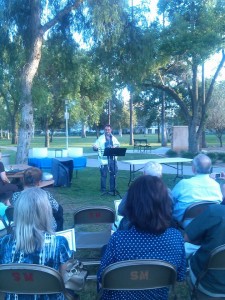 Watching from the balcony, I had a good view of the worship going on below. The fact that I was observing from the balcony presented an issue in itself, however. As part of an interfaith clergy meeting, I had been invited to observe worship at the Islamic Center of San Diego, but that meant following other people’s rules. In Islam men and women worship separately. In this case, the women participated from a balcony above the men’s worship space where the (male) leader recited the Arabic prayers and instructions.
Watching from the balcony, I had a good view of the worship going on below. The fact that I was observing from the balcony presented an issue in itself, however. As part of an interfaith clergy meeting, I had been invited to observe worship at the Islamic Center of San Diego, but that meant following other people’s rules. In Islam men and women worship separately. In this case, the women participated from a balcony above the men’s worship space where the (male) leader recited the Arabic prayers and instructions.
Afterwards we asked a few questions, but without arguments, as one would expect in an polite interfaith activity. Do more than manners inspire these activities?
Is interfaith conversation a good use of time?
I spend a lot of time in interfaith situations. Trinity has long been a member of, and I now serve on the board of, Interfaith Community Services which was founded with the idea that sharing resources is better than competing. Interfaith conversations aren’t just practical, however, to participate in them is to take a stand, not against other faiths but with them for something bigger.
While each of us believe passionately in our own tradition–why be part of a tradition if you don’t think it’s the best?–we also believe that together we will witness a broader perspective on the divine plan. For Christians the interfaith ideal is grounded on the Incarnation, which tells us that God is found in all of creation, not just in the church and its documents. We can learn things from other people of faith. We can see the holy in their lives.
So what did I learn? One obvious truth–these Muslims were committed to their faith. On a weekday afternoon, they had more people attending than Trinity has on a regular Sunday morning. Part of that is due to the particular worship requirements of Islam, of course, but it also has to do with the place of Islam in our country at this time. To declare yourself a Muslim takes some courage, becoming a target for so many. They are there because they see their worshiping community as ally and support. Worship is relevant.
Episcopal worship is sacred and beautiful, but is it relevant? Unlike our Muslim neighbors, we don’t feel a need to band together against a world of prejudice and danger. But I read Facebook. I know that many of us do feel that we are under attack. Both sides of the political spectrum are fighting for our lives, or at least our future. Our weapons are articles and online opinions; our arguments are passionate. Friendships are won and lost on this online battlefield. But what do these battles have to do with our Christian identity?
What if worship were relevant?
 If we anchor our identity and arguments in Christ, some things change. Certain commands become relevant, like the one about loving enemies. Jesus told us to love our enemies, but not because they were lovable or even because our love might convert them to our way of thinking. Love isn’t just a nicer way to fight. Love meant that we have something in common. The enemy doesn’t exist simply to make our lives miserable–in love we assume some sort of positive intention. If this is the case, we can disagree without unfriending each other. Connections and reconciliation become more important than being right because we become partners in the search for truth.
If we anchor our identity and arguments in Christ, some things change. Certain commands become relevant, like the one about loving enemies. Jesus told us to love our enemies, but not because they were lovable or even because our love might convert them to our way of thinking. Love isn’t just a nicer way to fight. Love meant that we have something in common. The enemy doesn’t exist simply to make our lives miserable–in love we assume some sort of positive intention. If this is the case, we can disagree without unfriending each other. Connections and reconciliation become more important than being right because we become partners in the search for truth.
Here again, we can learn from others. Interfaith dialogue begins with listening to another’s perspective: How do these traditions make sense to the user? What do these foreign prayers and separated worship teach the participant about God? Honest answers reveal holiness. I may not agree with the reasoning, but I can respect the answer. The dialogue partner isn’t an enemy, but the same attitude applies.
Listening is common ground
This works if we are grounded in our religious identity–if worship is relevant. We know where we belong, making change a much safer experience. We can dare to hear the other person, and maybe they can hear us. And it matters. As Christ’s people of reconciliation, by listening to others we will know who we are.
What if, instead of winning, our goal was reconciliation? We would begin as interfaith dialogue does, with the honest question–what leads you to understand the way you do? If we could get past the conspiracy theories and factual disagreements, maybe we could face the truth of the fears we share with our enemies–fears of loss and change, of being left out and left behind, of being ignored and forgotten. Maybe on common ground we could discover, not the common holiness which is the goal of interfaith dialogue, but the common purpose that should guide us as a society. Faith is the source of our courage and patience to get there; worship is the inspiration that tells us this is necessary.
What might make worship more relevant to our lives? How do you listen to others’ perspective without losing your own? Making connections instead of points changes the discussion. Is it possible?

One Response
Bravo, Mother Meg!!